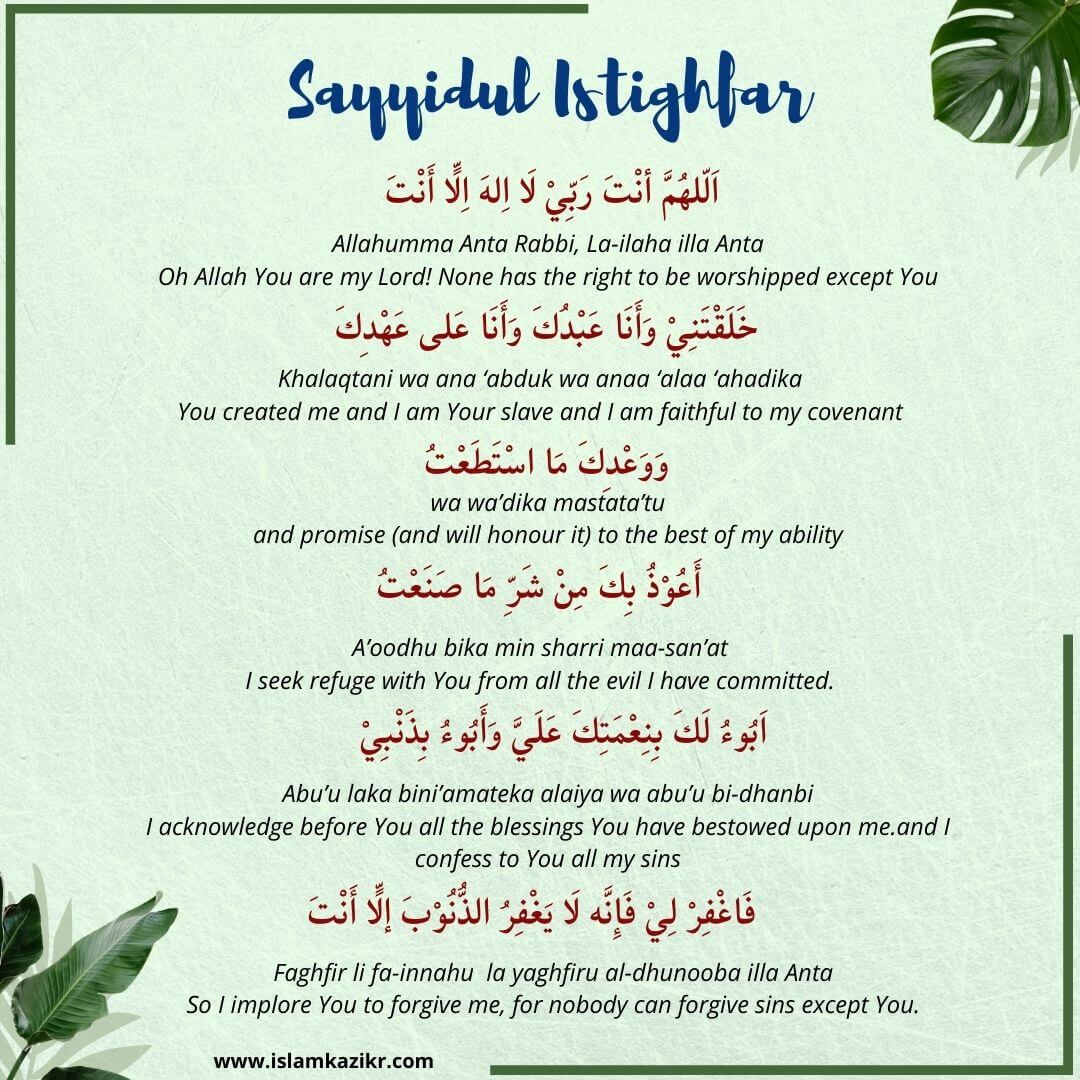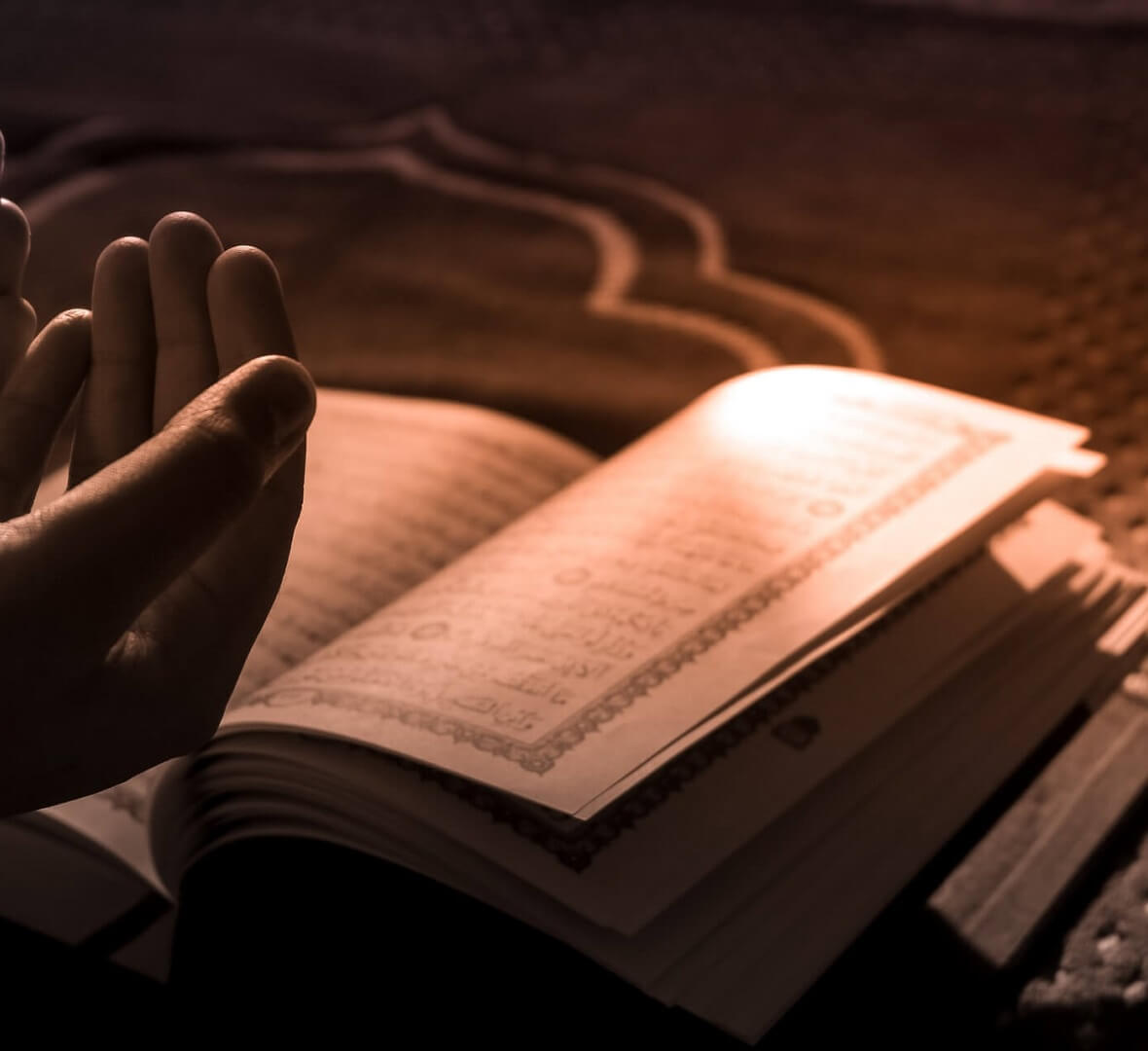Sayyid al-Istighfar/Sayyidul Istighfar is considered the master prayer for seeking forgiveness from Allah SWT. Before we understand the meaning of Sayyidul Istighfar, let’s see the importance of Istighfar first.
Abu Hurairah (Radi Allahu Anhu) narrated, that the Messenger of Allah SWT said:
“When the believer commits sin, a black spot appears on his heart. If he repents and gives up that sin and seeks forgiveness, his heart will be polished. But if (the sin) increases, (the black spot) increases. That is the Ran that Allah SWT mentions in His Book: “Nay! But on their hearts is the Ran (covering of sins and evil deeds) which they used to earn.” [83:14] (Sunnan Ibn Majah)
Importance of Istighfar
Istighfar is to admit our sins and desperately seek the forgiveness of Allah SWT for our misdeeds. In the Qur’an Allah SWT constantly prompts mankind to seek His Forgiveness as He is the ‘Oft-Forgiving’ and ‘Most Merciful.
Say, “O My servants who have transgressed against themselves [by sinning], do not despair of the mercy of Allah SWT. Indeed, Allah SWT forgives all sins. Indeed, it is He who is the Forgiving, the Merciful.” (Surah al-Zumar 39:53)
In many verses of the Qur’an, the blessings and benefits of Istighfar are also relentlessly stated. It has been recorded that when al-Hasan al-Basri (Radi Allahu Anhu) was often asked how one could improve their circumstances, he would always respond by saying “seek forgiveness from Allah SWT”.
He would also often quote these verses from Surah Nuh:
And said, ‘Ask forgiveness of your Lord. Indeed, He is ever a Perpetual Forgiver.
He will send [rain from] the sky upon you in [continuing] showers.
And give you increase in wealth and children and provide for you gardens and provide for you rivers. (Surah Nuh 71:10-123)
There is also a plethora of ahadith that advise mankind to seek forgiveness. A familiar hadith is a narration that:
Messenger of Allah SWT said, “Verily, Allah SWT is more delighted with the repentance of His slave than a person who lost his camel in a desert land and then finds it (unexpectedly)”. (Riyadh as-Salihin)
The importance of Istighfar is that when done sincerely, results in the transformation of man’s bad habits into something more pleasing to, and for, the sake of Allah SWT. This is Tawbah or repentance. In Dunya, Istighfar has the capacity to ease burdens and bring goodness to one’s life. When a man is in a habitual state of seeking forgiveness, he is perpetually in a state of submission and humility to Allah SWT, and therefore, Allah SWT’s Mercy is always upon him. The verses from Surah Nuh show the direct connection between asking forgiveness and receiving Allah SWT’s bounties in this life.
Also, while all of mankind will sin, it is the one who sincerely repents that will earn a place in Jannah.
It was narrated from Anas (Radi Allahu Anhu) that the Messenger of Allah SWT said:
“Every son of Adam commits sin, and the best of those who commit sin are those who repent.” (Sunnan Ibn Majah)
Sincere Istighfar should be a fundamental aspect of our daily routine of worship for it benefits man in the Duniya and the akhirah.
Related: You might also like to see the powerful Duas for forgiveness and Dua for Mercy.
What is Sayyid al-Istighfar?
Sayyid al-Istighfar/Sayyidul Istighfar is considered the master prayer for seeking forgiveness from Allah SWT. Hence its name: ‘Sayyid’ meaning ‘master’ or ‘Lord’ and ‘Istighfar’ – seeking forgiveness. It is the ‘most superior’ and most complete Istighfar dua according to the Prophet ﷺ, as narrated by Shaddad bin ‘Aws -mentioned in Sahih al-Bukhari, (6306, and 6323).
Sayyid al-Istighfar Hadith
In the narration of Imam Nasa’i, there is an encouragement to learn the dua. It is mentioned in this hadith that the Prophet ﷺ, said:
“Learn All of you, the greatest invocation of forgiveness (Sayyid al-Istighfar)”
– (Sunnan Al-Nasa’i, as mentioned in “The Greatest Invocation of Forgiveness by Shaikh ‘Abdu’l -Razzaq, 2016: 20)
The benefits of making the Sayyidul Istighfar dua as stated by Prophet Muhammad ﷺ:
“If somebody recites it during the day with firm faith in it, and dies on the same day before the evening, he will be from the people of Paradise; and if somebody recites it at night with firm faith in it, and dies before the morning, he will be from the people of Paradise.”
– (Sahih al-Bukhari 6306)
Sayyidul Istighfar Meaning in English
The Sayyid al-Istighfar dua in English translation & transliteration is as follows:

Sayyid al-Istighfar – why is this the Master Invocation?
Let us break down the contents of the Sayyid al-Istighfar dua to understand it better. It must be mentioned that much of what is stated in this juncture of the article is taken from the book The Greatest Invocation for Forgiveness by Shaikh ‘Abdu’l-Razzaq Ibn ‘Abdu’i-Muhsin al-Badr – a very thorough and intense analysis of the dua. I shall attempt to summarise some of its content here.
For the purpose of this article, I have broadly categorized the Sayyid al- Istighfar dua into three main sections. The first section, which includes the first few verses, deals with Tawhid. The latter part of the dua is Istighfar.
According to Shaikh ‘Abdu’l-Razzaq, the inclusion of these two significant matters of Tawhid and Istighfar is one of the main reasons the dua is considered the most excellent. A final category of analysis is the bridge between these two sections which is the Covenant.
a) Tawhid – the Hadith combines two Tawhids.
- Tawhid al-Rububiyyah – which is the knowledge and affirmation to accept the Oneness of Allah SWT and His Lordship.
- Tawhid ul–Uluhiyya – this means the direct and sincere worship of Allah SWT alone and that all good deeds are for Allah SWT alone.
اَلّلهُمَّ أنْتَ رَبِّيْ لَا اِلهَ اِلَّا أَنْتَ
Allahumma Anta Rabbi, La-ilaha illa Anta
Oh Allah You are my Lord! None has the right to be worshipped except You
خَلَقْتَنِيْ وَأَنَا عَبْدُكَ
Khalaqtani wa ana ‘abduk
You created me and I am Your slave
Many scholars affirm that Tawhid Al Rububiyyah necessitates Tawhid al-Uluhiyya since when declaring that there is no God except Allah it becomes compulsory to worship none but Him. A Master-slave relationship is established here., necessitating our servitude to Allah SWT alone and expecting our needs to be fulfilled by none but Him. Scholars claim that acknowledging the great attributes of Allah SWT is also a form of Tawhid (Tawhid al-Asma’ wa’l-Sifat). Such as affirming Him to be Al Khaliq – The Creator.
When we say “None has the right to be worshipped except You” we are also cleansing our hearts from worshipping our desires which inevitably leads to sin. To worship desires, too, is a form of shirk. Shaikh ‘Abdu’l-Razzaq says that all sins have an element of shirk. By establishing Tawhid we destroy the core of shirk while Istighfar eradicates the branches of it (The Greatest Invocation for Forgiveness, 2016:42)
b) Istighfar –
The dua concludes with a confession to sins committed and an acknowledgment that only Allah SWT can forgive us. It ties up the Tawhid from the beginning of the dua.
أَعُوْذُ بِكَ مِنْ شَرِّ مَا صَنَعْتُ
A’oodhu bika min sharri maa-san’at
I seek refuge with You from all the evil I have committed.
اَبُوءُ لَكَ بِنِعْمَتِكَ عَلَيَّ
Abu’u laka bini’amateka alaiya
I acknowledge before You all the blessings You have bestowed upon me.
وَأَبُوءُ بِذَنْبِيْ
wa abu’u bi-dhanbi
and I confess to You all my sins
فَاغْفِرْ لِيْ فَإِنَّه لَا يَغْفِرُ الذُّنُوْبَ إلَّا أَنْتَ
Faghfir li fa-innahu la yaghfiru al-dhunooba illa Anta
So I implore You to forgive me, for nobody can forgive sins except You.
In A’oodhu bika min sharri maa-san’at, we seek refuge in Him because we cannot rely on our own selves or anyone/anything else to provide that refuge.
The verse Abu’u laka bini’amateka alaiya, occupies an interesting position in the dua. It talks about Allah SWT’s blessings, yet the verse is sandwiched between two lines of confession. On the one hand, it is a testimony to the fact that Allah SWT continues to bless us despite all our transgressions.
And on the other hand, the extent of our transgression, disobedience to Allah SWT, and ingratitude to Him and His favors upon us, is amplified when supplicating Abu’u laka bini’amateka alaiya, and then following that up with wa abu’u bi-dhanbi – “I confess to you all my sins”. Despite all His blessings, we have sinned. We completely acknowledge our sins, we are remorseful about them, and admit our shortcomings in fulfilling our rights toward Allah SWT. Acknowledging one’s sins and being remorseful and regretful is a crucial first step in repentance.
A second matter conveyed through these lines of dua,
اَبُوءُ لَكَ بِنِعْمَتِكَ عَلَيَّ
Abu’u laka bini’amateka alaiya
I acknowledge before You all the blessings You have bestowed upon me
وَأَبُوءُ بِذَنْبِيْ
wa abu’u bi-dhanbi
and I confess to You all my sins
is the importance of maintaining a habit of being grateful and seeking forgiveness. As Muslims, we are expected to adopt an attitude of gratitude and repentance at all times. Ibn Taymiyyah has said:
“the servant is always between a blessing that requires his thanks and a sin that requires his seeking of forgiveness”
– (Majmoo al-Fataawaa 10/88-90)
The dua continues:
فَاغْفِرْ لِيْ فَإِنَّه لَا يَغْفِرُ الذُّنُوْبَ إلَّا أَنْتَ
Faghfir li fa-innahu la yaghfiru al-dhunooba illa Anta
So I implore You to forgive me, for nobody can forgive sins except You
The pleading of forgiveness and the absolute reliance on Allah SWT to forgive the sins because nothing and no one else can. We are humbled beyond measure at the end with complete submission to Allah SWT. We firmly establish Allah SWT’s supreme place in our hearts and affirm our return to our Lord from the things we placed above Him.
c) The Covenant
Finally, the central verses of Sayyid al-Istighfar deal with the covenant – our promise to Allah SWT to worship none but Him.
وَأَنَا عَلى عَهْدِكَ
wa anaa ‘alaa ‘ahadika
and I am faithful to my covenant
وَوَعْدِكَ مَا اسْتَطَعْتُ
wa wa’dika mastata’tu
and promise (and will honour it) to the best of my ability
They are a fitting bridge between the first lines that extol Allah SWT and the last lines seeking forgiveness. To elaborate,
وَأَنَا عَلى عَهْدِكَ
wa anaa ‘alaa ‘ahadika
and I am faithful to my covenant
expresses our firm conviction upon the Oneness of Allah SWT and the oath to keep to Allah’s commands and prohibitions (reminiscent of the oath we made to Allah SWT at the time our souls were extracted from Adam Alaihi Salaam). An oath, that was lost during our transgressions, is being reaffirmed. When the next words are uttered:
وَوَعْدِكَ مَا اسْتَطَعْتُ
wa wa’dika mastata’tu
and promise (and will honour it) to the best of my ability
we vouch to uphold that covenant but also address our shortcomings in our ‘abilities’ (to the best of my ability- according to my ability). Allah SWT is fully aware that each person’s ability varies. He only expects us to do the best we can. He is aware that we will fail time and again. Therefore, repentance and seeking forgiveness is the only way to rectify those shortcomings at all times. Hence, the fitting follow-up to these lines is the seeking of forgiveness, which was discussed earlier in ‘b- Istighfar’.
Conclusion
When a sin is committed by man, the consequences can be numerous. Sickness, lack of blessings in life, and loss of good condition are some of them. Hadith mentions that repentance is often the cure to such circumstances. Maintaining a perpetual call for forgiveness from Allah SWT can dramatically transform these circumstances. We have been told by Allah SWT Himself through the accounts of our bygone Prophets (peace be upon them all) how sincere repentance changed their conditions.
Adam Alaihi Salaam called out to Allah SWT after consuming the forbidden fruit. Yunus Alaihi Salaam beseeched Him from inside the belly of the whale. And their ranks, in the sight of Allah SWT, were raised after Istighfar. These stories contain profound messages to mankind about the forgiving nature of our Lord, and how if the best of men could err and then seek His forgiveness, then surely we too must do so. Our Prophet ﷺ himself would seek repentance over a hundred times a day (Sahih Muslim).
Sayyid al-Istighfar has many significant elements that make it one of the most effective Istighfar Duas. Hence, Prophet Muhammad ﷺ urged us to learn and use it as often as possible. As a dua of forgiveness, it contains all necessary aspects: extolling Allah SWT, humbling ourselves before Him, acknowledging our sins, and then sincerely seeking His help, in order to restore our relationship with our Lord once again. When a servant acknowledges his sins and then sincerely seeks forgiveness, then surely Allah SWT will forgive.


